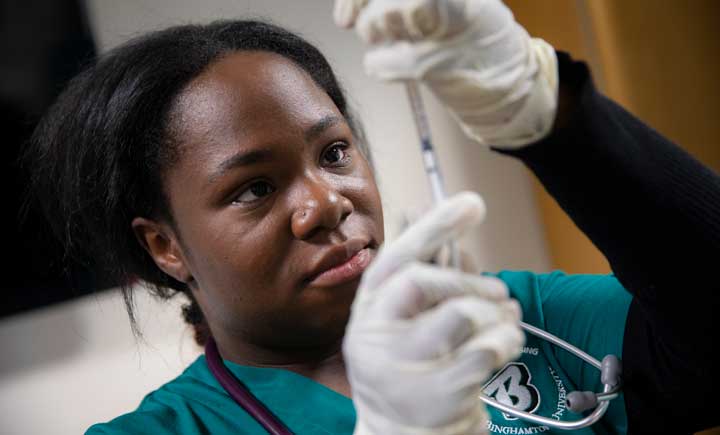Nursing Class of 2019 scores big on national certification exam

Graduates of the Bachelor of Science in nursing programs at Binghamton University’s Decker College of Nursing and Health Sciences passed a national nursing exam in 2019 with higher results than graduates in the previous 16 years!
To become registered nurses, nursing school graduates must pass the National Council for Licensure Examination-RN (NCLEX-RN) before being granted a nursing license by the state where they met the requirements. A nursing license gives graduates permission to practice nursing, while the NCLEX-RN ensures they are prepared for entry-level nursing practice.
In 2019, Decker nursing graduates achieved a 96% pass rate on their first attempt taking the NCLEX-RN, the highest percentage in the recent history of the bachelor’s program, according to Meg White, clinical assistant professor of nursing and undergraduate program director.
This score is also higher than the state and national averages.
“Students’ NCLEX pass rates have been improving,” said White. “This is due to a number of changes we made in our curriculum over several years, as well as a concerted effort from our undergraduate faculty.”
One of the steps Decker took to better prepare students for the NCLEX-RN was creating an exam grade policy that states students must pass all course exams with a grade of 69.5 or better before any other course elements are included in their grade. As a result, students are studying harder and learning more.
Additionally, White altered the spring schedule for third-year nursing students so their didactic and clinical experiences align. This means, for example, they receive content about pediatric nursing while taking part in pediatric clinical experiences. Programming for senior nursing students was also reorganized; these students now have the same clinical setting and faculty member for the entire semester. White said this continuity has improved learning and performance.
Decker also began using textbooks with enhanced features such as mastery quizzes that help students identify areas where they need improvement. Tests link students to the section in the text where the information is presented so they can restudy data. Decker provides each student with a copy of the medical-surgical version of this digital textbook to ensure they have a regularly updated reference for NCLEX-RN prep and to refer to throughout their career.
Also helpful is the Binghamton University Libraries’ acquisition of a system that provides comprehensive study materials and question banks specifically for nursing students.
To help students become comfortable with the computerized format of the NCLEX-RN exam, Decker faculty began using a similar electronic testing platform for course exams. They also adapted course exams to include “Select all that apply” formatting for answers, a testing strategy common on the national exam.
“By helping students gain a level of comfort with the delivery system for the NCLEX, they can now focus on the content,” White said.
In addition, Decker’s Nursing Student Association coordinates a NCLEX-RN Prep Night. At this annual spring event, held on campus, representatives from organizations that provide exam preparation materials and services present their offerings to the students.
“Everyone learns differently,” said White. “Some students want to take a prep course from an instructor while others may simply want additional study materials. Some students don’t want any extra help. Prep Night gives them the chance to explore their options and choose what works best for them and fits in their budget.”
Finally, White also credits the dedication of the undergraduate nursing faculty for the improvement in the students’ NCLEX-RN test scores.
“We have a really cohesive undergraduate faculty,” she said. “They pitch in to help one another and our students whenever necessary.”
White also said that while some of the changes increased faculty workload, they unreservedly embraced them. “I never heard a single complaint … to my face or otherwise!” she said.

